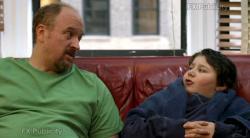Last week, David noted how prominently Louie’s love life has figured into each episode this season. Last night broke the streak. In the “Barney” section, death took center stage, while sex, if you can call it that, twirled, desultory, around a stripper pole off to the side. The episode began, with its tale of Barney Ross—a comedy-club schemer and thief, lowered into the soil in a crappy “Ikea shelf,” without friends or ceremony—as an elaboration on the scene from “Telling Jokes/Set Up” in which Louie couldn’t recall the existence of a dead comedian. What unites the season’s love-connection material with its gone-and-forgotten material is obvious: a preoccupation on C.K.’s part with being—and dying—alone. Neither Louie nor Robin (an appealingly subdued but ultimately underused Williams) liked Barney one bit. Their conversation about him was a merciless requiem, to quote Serge Gainsbourg, pour un con. But the idea of Barney’s burial going unattended and uncommemorated unnerved them nonetheless: I’ll come to yours, each promised the other.
At the diner we learn something complicatedly poignant about Barney, which makes him yet another character to whom C.K., in his stand-up and on this show, has granted unlikely dimensions. Even as Barney fleeced comedians and in-laws, he attempted to befriend and bond with them, inviting them to his boat and, less glamorously, to Sweet Charity. Everyone blew him off, the misguided prick, but Barney went to the strip club anyway, it turns out, and did some meaningful bonding on his own. Through Robin’s and Louie’s glimpse into Barney’s unknown life at Sweet Charity, we discover that he couldn’t have been all bad. In this bleak hovel, he broke through the deadened air of transactional intimacy to forge many meaningful relationships—a testament to his tipping, one assumes, but also, it seemed, to something in his spirit that remained invisible in his other relationships.
At least, that’s the point I thought C.K. was trying to make. That scene-capping laughter back on the street didn’t work for me, either, David, in part because it felt fake (in a way laughter usually doesn’t on this show) and in part because it felt oddly mean-spirited and dismissive of the unlikely scene we’d just witnessed. Maybe that was the point—faced with the oblivion that awaits us all at the end of the Brooklyn-Battery Tunnel, these guys attempt a defiant belly laugh—but I’m not sure. My reaction here speaks to Allison’s question a few weeks ago about C.K. perpetrating a certain anything-goes sloppiness under the cover of formal inventiveness. I typically praise Louie’s tonal scramble, but this sequence—somber, unfamiliar black-and-white opening credits, then awkwardness and candor at the finely observed diner scene, then over-the-top stripper grief, then callous cackle—verged on incoherent.
I preferred the episode’s second part, which balanced its tones more successfully. Never’s mom’s vagina removal and no-carbon dietary rule, not to mention the massive car accident Never caused, were fantastically overboard. Never’s weirdness and tub-diarrhea, though, occupied a grayer area between comedy and tragedy, at once gross and sympathetic. Sort of like Glen Bishop in early seasons of Mad Men, Never was presented, on the whole, as a weirdo-innocent. It’s not his fault—you saw his mom! His conversation with Louie on the couch at the end of the episode was so interesting, though, because there’s a powerful sense in which it’s about to be his fault. Louie addresses Never as both a confused kid (“If there’s anything you ever want to talk about …”) and an all-too-imminently fucked-up adult who needs someone to tell it to him straight (“You wreck everything”).
The link between the “Barney” and “Never” segments? Unlikable title characters who alienate and injure people even as they long, on another level, to connect with them. “I want you to give me a bath and wash me” is C.K.’s perfect creepy-sad articulation of exactly this contradiction. The difference between Never and Barney is that there’s still time for one of them.
It was great to see J.B. Smoove show up as a gravedigger, and I felt cheated that his appearance was so brief. (Nowhere near as brief as Artie Lange’s blink-and-you-missed-it truck driver, of course. By the way, David, Smoove’s fake-French-speaking colleague was your man McKinley Belcher III!)
Speaking of cameos, I thought the radio gag with Opie, Anthony, Schumer, and Norton was successful, even if the Kansas City kicker fell flat with the Pig and me both. FM goofballs like these are easy targets—and Parks and Recreation has set the bar high for lampooning them, with Crazy Ira and the Douche—but I loved C.K.’s surreal, inspired choice to have them talk the liveliest gibberish he’s written since Pootie Tang. I attempted a partial transcription.
Tracer: That’s a bowder dine, comin’ down channa!
The Pig: Etsa da bag siss!
Diane (“The Hole”): Duuude!
What did you guys think about the whole clammy down cow thing going down at the ratty-dow?
Jonah
